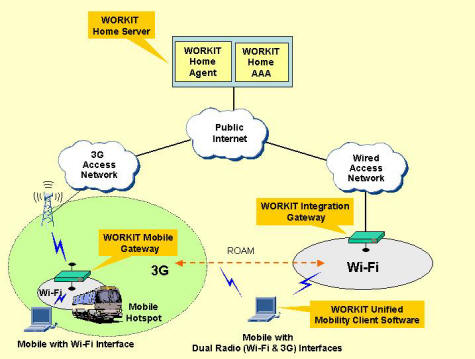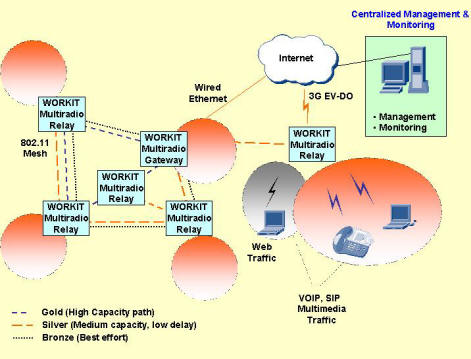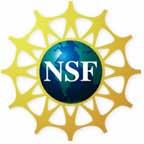
WORKIT for seamless integrated WLAN and Wide Area cellular networks

WORKIT for infrastructure mesh networks
NSF CRI: Collaborative Research: WORKIT: A Universal Wireless Open Research KIT
 WORKIT for seamless integrated WLAN and Wide Area cellular networks
|
 WORKIT for infrastructure mesh networks |
The lack and need for experimental wireless tools
and platforms available to the research community was a common theme in the NSF
Wireless Network Workshop Report (9/03). The NSF NETS program and PROWIN, NOSS
focus programs have also emphasized a strong systems focus. It is in this spirit
that this proposal is made. Building upon their prior work and collaborations,
Columbia Internet Research Technologies (IRT) Lab, MOMENT Lab at UCSB, the
Networking Research Center at Penn State, and Bell Laboratories propose to
produce a Wireless Open Research Kit (WORKIT) platform in a Community Resource
Development project under the CRI program.
The produced kit will consist of a set of software tools and modules that can be
used in a wide range of wireless networking systems research and education. By
making the platform available to the research community, the project hopes to
dramatically shorten the time to develop comprehensive system implementations of
wireless related research ideas and avoid duplication of effort across the
community. The availability of the kit will stimulate new ideas and research
efforts that otherwise would be avoided due to complexity in building a system
prototype foundation. It is expected that the kit will find applicability in
many NSF funded programs and test beds. Additionally, the components of the
produced kit can be used for educational courses on mobile networking as a
hands-on lab tool or easy-to-use classroom supplement. The standardized kit,
available as either software-only download or packaged on low-cost off-the-shelf
hardware, will promote interaction across universities as well as with
industrial research labs. We propose a three phase approach to deliver a
comprehensive Universal Wireless Open Research Kit:
Phase I: We propose to enhance and further develop the software and
systems built at Bell Labs for the IOTA (Integration of Two Access Technologies)
project and package a distributable form of the technology components containing
source code (under non-commercial license) and documentation. The goal of this
phase is to provide a complete baseline system foundation for the diverse issues
in wireless networks such as mobility management, interlayer awareness, software
algorithms for best network selection, reconfiguration, security, accounting,
authentication, policy download/enforcement, and hybrid wireless networking. The
IOTA components provide use of multiple radios, allowing seamless handoff and
transparency while roaming across 802.11 and 3G wireless networks. Additionally,
the platform enables mobile 802.11 hotspots using 3G high speed wireless data
backhaul links. Separation of networking layers from the underlying physical
layer allows the software components to be used with other wireless radio
technologies. The distributed components will consist of the IOTA mobility
client software, MobileIOTA gateway, and a Backend Mobility Server, which form a
set of end-to-end tools. The Phase I kit will be available to the co-PIs on the
proposal within the first year.
Phase II: The second phase will demonstrate extensibility of the kit and
further enhance its core capabilities leveraging the expertise of the university
partners. Rather than providing a random collection of additional components, we
focus on providing new essential building blocks for a wide range of wireless
networking research and education. The university partners will integrate the
results of their research in the areas of mesh networking, ad hoc and multimedia
network monitoring, mobile access routers, and multimedia service enablers.
Halfway in the second phase, the participating groups will advertise the
availability of the kits to the academic community and solicit proposals to use
the kit for research and education.
Phase III: The third phase will consist of dissemination of the kits and
continuing support in the form of mailing lists, a web site with documentation,
FAQ, message boards, and repositories for new modules added by the community.
The academic partners will also focus on development and distribution of
reference course materials that use the WORKIT kits. Several workshops will be
sponsored for training on the use and programmability of the kit and to report
on new enhancements done by the kit users. Contributions from the community can
be subsumed into the kit for future distribution.
Broad Impact
We believe that the Wireless Open Research Kit will have a major impact in
the wireless research community by providing a standard platform that can serve
as a starting point for systems prototyping, education, and experimentation. It
will stimulate new ideas and research efforts, dramatically shorten the time to
develop comprehensive system implementations of research ideas and avoid
duplication of research efforts. It will also provide a hands-on learning tool
for the wide ranging networking aspects.
Funded by US National Science Foundation under grants

NSF Award Numbers
0454288 (Columbia University)
0454174 (Lucent Technologies Bell Labs),
0454329 (University of California, Santa Barbara)
0453830 (Penn State University)